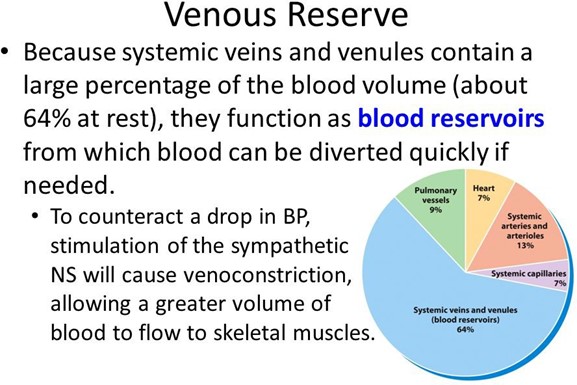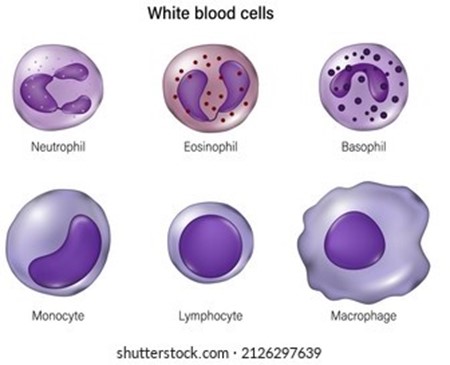Which type of blood vessel holds the greatest volume of blood?
Capillary.
Vein.
Arteriole.
Artery.
The Correct Answer is B
Veins are the type of blood vessel that holds the greatest volume of blood and serve as reservoirs for blood.

According to 1, veins contain about 70-80% of the blood volume in circulation.
Veins are also called capacitance vessels because they can expand and store more blood when needed.
Choice A. Capillary is wrong because capillaries are very thin and narrow vessels that allow the exchange of gases and nutrients between the blood and the tissues.
Capillaries have a very small volume compared to veins.
Choice C. Arteriole is wrong because arterioles are small branches of arteries that regulate blood pressure and blood flow to the capillaries.
Arterioles have a higher resistance and lower volume than veins.
Choice D. Artery is wrong because arteries are thick and muscular vessels that carry oxygen-rich blood away from the heart to the rest of the body.
Arteries have a higher pressure and lower volume than veins.
Normal ranges for blood volume vary depending on age, sex, weight, and health status, but generally range from 4 to 6 liters for adults.
Nursing Test Bank
Naxlex Comprehensive Predictor Exams
Related Questions
Correct Answer is B
Explanation
The correct answer is choice B. True.
As a result of the allergen-antibody reaction, mast cells release histamine.
This is because when mast cells are exposed to an allergen that binds to IgE antibodies attached to their FcɛRI receptors, they release histamine and other inflammatory mediators.
Histamine causes vasodilation, increased capillary permeability, mucus secretion, and smooth muscle contraction, which result in allergic symptoms such as itching, swelling, sneezing, and wheezing.
Choice A is wrong because it is the opposite of the correct answer.
Mast cells do release histamine in response to allergen-antibody reactions. Some additional sentences are:
Normal ranges of histamine levels vary depending on the tissue and the method of measurement, but they are usually low in healthy individuals and elevated in allergic conditions.
Histamine can be degraded by enzymes such as diamine oxidase and histamine N-methyltransferase, or inhibited by drugs such as antihistamines.
Correct Answer is C
Explanation
This type of blood cell is a granulocyte that has a bi-lobed nucleus and red granules in the cytoplasm.

Eosinophils are involved in allergic reactions and parasitic infections.
Choice A is wrong because basophils are granulocytes that have a lobed nucleus and dark blue or purple granules in the cytoplasm.
Basophils are involved in inflammatory responses and histamine release.
Choice B is wrong because lymphocytes are agranulocytes that have a large round nucleus and a thin rim of cytoplasm.
Lymphocytes are involved in immune responses and produce antibodies.
Choice D is wrong because monocytes are agranulocytes that have a kidney-shaped nucleus and a pale blue cytoplasm.
Monocytes are involved in phagocytosis and tissue repair.
Choice E is wrong because neutrophils are granulocytes that have a multi-lobed nucleus and pale pink granules in the cytoplasm.
Neutrophils are involved in bacterial infections and inflammation.
Whether you are a student looking to ace your exams or a practicing nurse seeking to enhance your expertise , our nursing education contents will empower you with the confidence and competence to make a difference in the lives of patients and become a respected leader in the healthcare field.
Visit Naxlex, invest in your future and unlock endless possibilities with our unparalleled nursing education contents today
Report Wrong Answer on the Current Question
Do you disagree with the answer? If yes, what is your expected answer? Explain.
Kindly be descriptive with the issue you are facing.
